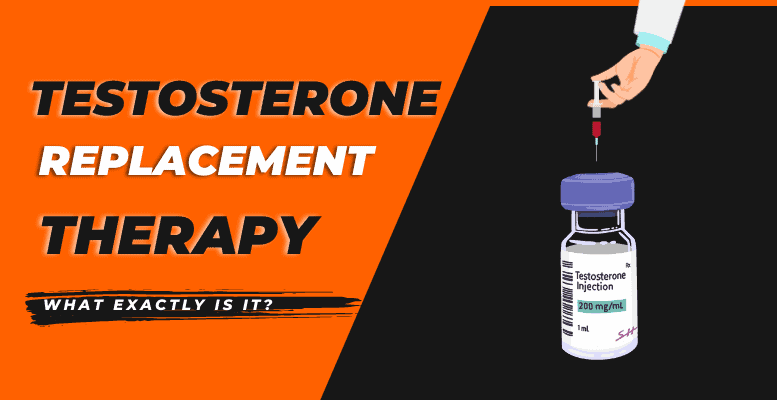Welcome to one of my favorite topics! This is an increasingly popular topic in men’s health: What is Testosterone Replacement Therapy (TRT). Do you ever found yourself feeling unusually fatigued, experiencing a decrease in libido, or noticing a sudden change in mood? You might have stumbled upon TRT in your online searches.
Testosterone levels naturally decline as men age, but sometimes, they can dip lower than the norm, causing a range of symptoms. That’s where TRT comes into play. Join me as we unpack what Testosterone Replacement Therapy is, who it’s for, its benefits, risks, and much more.
Understanding Testosterone: The Basics
Defining Testosterone
Produced mainly in the testicles and to a lesser degree in the adrenal glands, testosterone is an essential hormone that helps shape and maintain typical male traits. Women also have this hormone, albeit in much smaller quantities. As part of the androgen hormone family, testosterone isn’t just a one-trick pony; it oversees various physiological functions. Whether you’re a man or a woman, it’s a pretty important player in the health and wellness game.
Testosterone’s Role in the Body
Testosterone is responsible for a range of bodily functions, including developing male reproductive tissues, promoting muscle and bone growth, stimulating the production of red blood cells, and influencing sexual drive and overall well-being.
Natural Decline of Testosterone Levels
As men age, it’s common for their testosterone levels to decline gradually. This decline typically begins around the age of 30 and continues at an average rate of 1% per year. This natural decline can lead to various symptoms and health concerns, prompting individuals to explore testosterone replacement therapy.

What is Testosterone Replacement Therapy?
An Overview of TRT
Testosterone replacement therapy (TRT) is a medical treatment designed to supplement low testosterone levels in the body. By introducing external sources of testosterone, TRT aims to restore hormone levels to a more optimal range, potentially alleviating associated symptoms and improving overall quality of life.
Indications for TRT
TRT is typically recommended for individuals who have clinically diagnosed low testosterone levels, commonly known as hypogonadism. It may also be considered for those experiencing symptoms associated with low testosterone, even if their levels fall within the normal range.
Types of TRT
Various forms of TRT are available, including testosterone injections, gels, creams, pellets, and patches. Each method has its own pros and cons, and the choice depends on factors such as personal preference, convenience, and individual requirements.
Signs and Symptoms of Low Testosterone
Physical Symptoms
Low testosterone can manifest in physical symptoms such as reduced muscle mass and strength, increased body fat, decreased bone density, fatigue, and decreased body hair growth.
Emotional and Mental Symptoms
In addition to physical changes, low testosterone can impact mood, leading to irritability, depression, reduced motivation, and difficulty concentrating.
Impact on Sexual Health
I find this is what captures most people’s interest in TRT. I would say this Is the most well-known effect of low testosterone is its impact on sexual health. Men with low testosterone may experience decreased libido, erectile dysfunction, reduced fertility, and diminished overall sexual satisfaction.
Diagnosis of Low Testosterone
Medical Evaluation
Diagnosing low testosterone involves a comprehensive medical evaluation, which includes a review of symptoms, medical history, and a physical examination. It’s crucial to rule out other potential causes of the symptoms before considering TRT.
Blood Tests and Hormone Level Assessment
Blood tests are conducted to measure testosterone levels. A morning blood sample is typically collected, as testosterone levels are highest. Other hormone levels may also be evaluated to comprehensively understand the individual’s hormonal profile.
Determining the Need for TRT
Pursuing TRT is based on a combination of factors, including symptoms, medical history, physical examination, and hormone level assessment. A healthcare provider with expertise in hormone therapy can guide individuals through the decision-making process.

Benefits of Testosterone Replacement Therapy
Improved Energy Levels
One of the notable benefits of TRT is the potential for increased energy levels and reduced fatigue. Individuals may experience improved vitality, stamina, and overall well-being.
Enhanced Muscle Mass and Strength
Testosterone plays a significant role in muscle development and strength. TRT can aid in maintaining and building muscle mass, making it a valuable tool for individuals looking to improve their physique and athletic performance.
Increased Libido and Sexual Function
One of the primary reasons individuals explore TRT is to address sexual health concerns. By restoring testosterone levels, TRT can improve libido, erectile function, and overall sexual satisfaction.
Mood and Cognitive Improvements
Low testosterone has been associated with mood disorders such as depression and irritability. TRT can potentially improve mood, reduce feelings of anxiety, and enhance cognitive function, including memory and concentration.
Risks and Side Effects of Testosterone Replacement Therapy
Potential Risks Associated with TRT
Although TRT is generally safe when administered under medical supervision, some risks are involved. Potential risks include the exacerbation of underlying prostate conditions, increased risk of blood clots, and potential impact on fertility.
Side Effects and Complications
If you are taking a healthy lower dose, you shouldn’t have to worry; some experience these side effects. Acne, oily skin, fluid retention, breast enlargement (gynecomastia), and changes in cholesterol levels.
Monitoring and Managing Risks
Regular monitoring of hormone levels and overall health is essential during TRT. Healthcare providers will assess for any potential complications, adjust dosages if necessary, and provide guidance on managing potential risks associated with the therapy.
Administration of Testosterone Replacement Therapy
Treatment Options: Injections
Testosterone injections, administered by a healthcare professional, are a common method of TRT. These injections typically occur every 1-2 weeks and provide a controlled release of testosterone into the bloodstream.
I also wrote a separate article on the Best Testosterone Injection.
Topical Applications: Gels and Creams
Topical gels and creams offer an alternative to injections. These products are applied to the skin, usually on the shoulders, upper arms, or abdomen, and absorb into the bloodstream. They are generally applied daily, allowing for a steady release of testosterone.
Other Delivery Methods: Pellets and Patches
In addition to injections and topical applications, testosterone replacement can be achieved using pellets or patches. Pellets are implanted under the skin and release testosterone gradually over several months. Patches are applied to the skin and deliver testosterone through absorption.
The Role of Lifestyle Modifications
Diet and Exercise
While TRT can provide significant benefits, supporting the therapy with a healthy lifestyle is essential. A balanced diet is really going to maximize your results. I recommend you find a diet rich in nutrients and adequate protein. Coupled with regular exercise, it can maximize the benefits of TRT and support overall well-being.
Sleep and Stress Management
Adequate sleep and effective stress management play crucial roles in maintaining hormonal balance. Prioritizing quality sleep and implementing stress-reducing techniques such as meditation, yoga, or engaging in hobbies can complement the effects of TRT.
You may want to take a look over another article I wrote on how to get better deep sleep.
Managing Other Health Conditions
Certain health problems like obesity, diabetes, and heart disease can throw your testosterone levels out of whack. Here’s where good healthcare and making healthier lifestyle choices can help – not only for managing these conditions but also for boosting your overall health. Plus, doing so can enhance the effectiveness of TRT. It’s a win-win situation – you get better health and optimized testosterone levels!

Considerations and Precautions
Long-Term Commitment to TRT
TRT is typically a long-term commitment, requiring regular monitoring and ongoing therapy. Individuals considering TRT should be prepared for the dedication required to maintain hormone balance and manage potential risks.
Regular Follow-ups and Monitoring
Regular follow-ups with healthcare providers are necessary to monitor hormone levels, evaluate symptoms, and adjust treatment as needed. These appointments provide an opportunity to address any concerns and ensure optimal results.
Potential Interactions with Other Medications
It’s crucial to inform healthcare providers about all medications, supplements, and herbal remedies being taken, as they may interact with TRT. Such interactions can affect the efficacy of TRT or potentially pose risks to overall health.
Conclusion: Is TRT Right for You?
Discussing with Your Healthcare Provider
If you’re experiencing symptoms of low testosterone or considering TRT, discussing your concerns with a knowledgeable healthcare provider is crucial. They can assess your situation, conduct necessary tests, and guide you in making an informed decision.
Weighing the Pros and Cons
Understanding TRT’s potential benefits, risks, and side effects is essential in making an informed decision. Weighing these factors, along with personal circumstances and goals, will help determine if TRT is the right choice for you.
Making an Informed Decision
Pursuing TRT should be made in consultation with a healthcare professional. With all the great TRT clinics, considering all aspects, discussing concerns, and reviewing the available options, you can make an informed decision that aligns with your needs and health goals.
Final Word
Testosterone replacement therapy offers a potential solution for individuals experiencing low testosterone levels and associated symptoms. TRT can help restore hormonal balance and improve overall well-being through proper diagnosis, monitoring, and personalized treatment plans.
I have provided a comprehensive overview, but consulting with a healthcare provider for personalized advice and guidance tailored to your unique circumstances is important. There are some great Testosterone Replacement Clinics out there.
I wrote a separate article on a supplement I took that increased my Free Testosterone very fast and significantly. You can find my Boron Free Testosterone increase here
This post may contain affiliate links which means I may receive a commission for purchases made through links. I will only recommend products that I have personally used! Learn more on my Privacy Policy Page.
